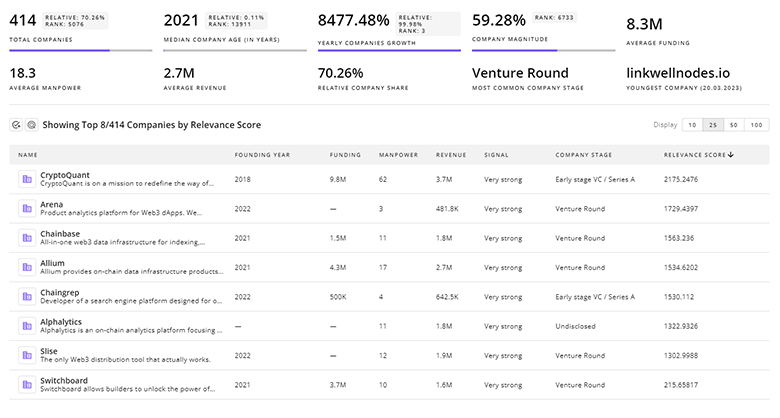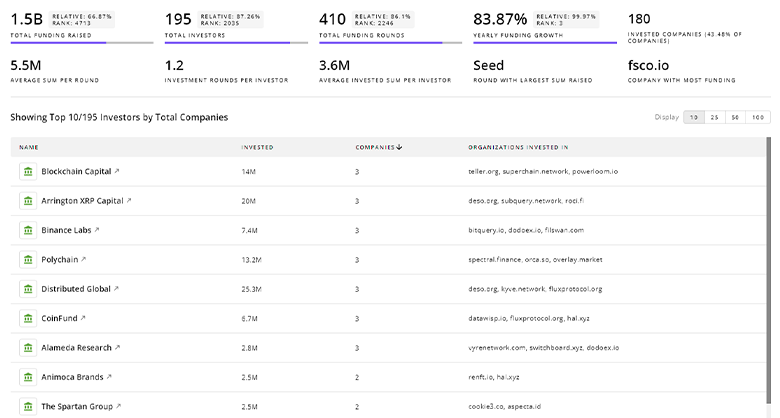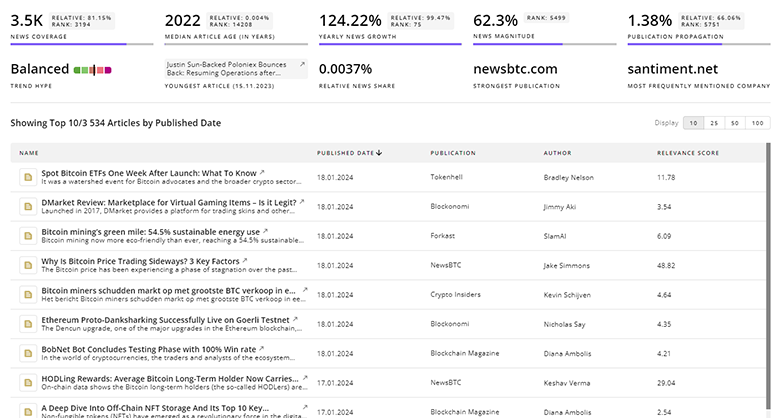
Nanomaterials Report
: Analysis on the Market, Trends, and TechnologiesThe nanomaterials landscape is accelerating with over $59.79 billion in total funding backing 5,823 active companies and a 17.03% annual rise in funding rounds, reflecting surging investor confidence in applications spanning healthcare, electronics, and sustainable materials and fueled by a projected global market expansion from USD 16.7 billion in 2025 to USD 68.2 billion by 2035 at a 15.1% CAGR (Nanomaterials Market Growth & Outlook, 2025-2035).
We last updated this report 180 days ago. Tell us if you find something’s not quite right!
Topic Dominance Index of Nanomaterials
To gauge the impact of Nanomaterials, the Topic Dominance Index integrates time series data from three key sources: published articles, number of newly founded startups in the sector, and global search popularity.
Key Activities and Applications
- Production of graphene and carbon nanotubes for electronics and conductive applications, driven by high conductivity and mechanical strength requirements (Nanomaterials Market Size, Share And Growth Report, 2030).
- Synthesis of metal oxide nanoparticles, utilized in catalysis, energy storage, and medical diagnostics for their tunable optical and reactive properties.
- Development of nanocomposites incorporating graphene nanoplatelets and carbon nanotubes, enhancing mechanical strength and thermal stability in automotive and aerospace sectors.
- Scaling of cellulose nanofiber production from waste feedstocks to produce sustainable packaging and composite materials for the circular bioeconomy.
- Advancement of polymeric and lipid-based nanoparticles for targeted drug delivery and diagnostics in oncology and regenerative medicine.
- Implementation of advanced nanofabrication techniques, such as electrospinning and 3D nanoprinting, enabling precise construction of nanostructures for sensors and biomedical devices (Nanofabrication for Smart Nanosensor Applications).
Emergent Trends and Core Insights
- Investor enthusiasm remains strong, as evidenced by a 17.03% annual growth in funding rounds, underscoring growing confidence in nanomaterials technologies.
- The global nanomaterials market will nearly quadruple from USD 16.7 billion in 2025 to USD 68.2 billion by 2035 at a 15.1% CAGR, driven by broad industrial adoption.
- Asia-Pacific is emerging as the fastest-growing regional market, supported by strong electronics and energy storage sectors, while North America retains a 32.7% share in 2024.
- Trade tensions and tariff fluctuations threaten supply chains for critical inputs like carbon nanotubes and graphene, with potential delays in electronics and composite materials innovations (Nanomaterials Global Market Report 2025).
- Sustainability mandates are driving the rise of renewable-feedstock nanomaterials, highlighted by scaling cellulose nanofibers for packaging that could capture 12% of the global market by 2028.
- Regulatory scrutiny in North America and Europe is intensifying, with evolving safety standards and screening requirements that may slow certain commercial rollouts.
Technologies and Methodologies
- Two-photon polymerization enabling sub-micron additive manufacturing for microoptics, leveraging focused photochemical crosslinking to achieve features below 100 nm (Nanoscribe).
- Pulsed thermal nanoimprint lithography allowing ultrafast patterning of surfaces at resolutions down to 10 nm in microseconds, suited for large-area applications
- Electrospinning techniques for fabricating nanofibers used in tissue engineering and high-efficiency filtration membranes (Nanomaterials for Theranostics and Tissue Engineering).
- Atomic force microscopy and scanning probe methods for nanoscale surface characterization and custom industrial solutions, integrating into production lines for precision quality control (Nanosurf).
- Real-time nanoparticle process analytical technologies, such as photon density wave spectroscopy and optofluidic force induction, for in-situ monitoring and digital process control of nanoparticle synthesis (NanoPAT).
Nanomaterials Funding
A total of 1.6K Nanomaterials companies have received funding.
Overall, Nanomaterials companies have raised $66.5B.
Companies within the Nanomaterials domain have secured capital from 6.4K funding rounds.
The chart shows the funding trendline of Nanomaterials companies over the last 5 years
Nanomaterials Companies
- VERDE Nanomaterials: Specializes in converting waste feedstocks into affordable cellulose nanofibers, targeting sustainable packaging and composites. The company's green chemistry approach produces high-value nano-fibrils for electronics, filtration, and materials, addressing environmental regulations and circular economy demands. VERDE's scalable process aims to replace petroleum-based materials and reduce lifecycle emissions, positioning it for partnerships in consumer goods and automotive suppliers (VERDE Nanomaterials; market share projected 12% by 2028 per Nanomaterials Market Size, Share, Trends Report, 2033).
- SMENA Sense AB: Develops 2D MoS2-based nanosensor substrates with selective detection of gases like NO2 and NH3. Their platform integrates directly into mobile and IoT devices for environmental monitoring, combining material synthesis and MEMS fabrication to deliver miniaturized, low-power sensors for smart cities and industrial safety.
- ThunderNIL Srl: Offers Pulsed-NIL technology for rapid thermal nanoimprint lithography, achieving patterning cycles under 1 ms across areas >100 cm^2 at 10 nm resolution. Their end-to-end solution includes tools, stamps, and processes, enabling biotech, optoelectronic, and anti-counterfeiting applications with unmatched throughput.
- Elementag: Builds invisible, permanent nanomarkers by embedding nanoparticles into any substrate, providing traceability and anti-counterfeiting across supply chains. Their particle-based tagging can authenticate products from pharmaceuticals to high-value goods, with signal detection via spectroscopic or optical readers.
- Nanogami: Leverages DNA origami to assemble ultra-miniaturized biochips with modular sensor "breadboards," offering multiplexed detection of biomolecules for diagnostics and research. Backed by Germany's SPRIND, Nanogami's horizontal platform supports proteomics, transcriptomics, and sequencing workflows, enabling high-density, user-defined sensor arrays for personalized medicine.
Enhance your understanding of market leadership and innovation patterns in your business domain.

6.2K Nanomaterials Companies
Discover Nanomaterials Companies, their Funding, Manpower, Revenues, Stages, and much more
Nanomaterials Investors
TrendFeedr’s Investors tool offers comprehensive insights into 4.8K Nanomaterials investors by examining funding patterns and investment trends. This enables you to strategize effectively and identify opportunities in the Nanomaterials sector.

4.8K Nanomaterials Investors
Discover Nanomaterials Investors, Funding Rounds, Invested Amounts, and Funding Growth
Nanomaterials News
TrendFeedr’s News feature provides access to 43.3K Nanomaterials articles. This extensive database covers both historical and recent developments, enabling innovators and leaders to stay informed.

43.3K Nanomaterials News Articles
Discover Latest Nanomaterials Articles, News Magnitude, Publication Propagation, Yearly Growth, and Strongest Publications
Executive Summary
Nanomaterials have entered a phase of rapid commercialization and technical maturation, underpinned by strong capital inflows and a projected CAGR above 15%. Key activities span from nanoparticle synthesis and advanced nanofabrication to integration in composites and biomedical platforms, each driven by sector-specific needs in electronics, healthcare, and sustainability. Emerging technologies such as high-resolution 3D printing, pulsed nanoimprint lithography, and real-time process analytics are setting new performance benchmarks. Strategic insights point to the Asia-Pacific region as the primary growth engine, while regulatory and supply-chain considerations will shape risk management. Companies that master scalable, eco-friendly production and align with evolving safety frameworks will be best positioned to lead the next wave of nanomaterials innovation.
We value collaboration with industry professionals to offer even better insights. Interested in contributing? Get in touch!











